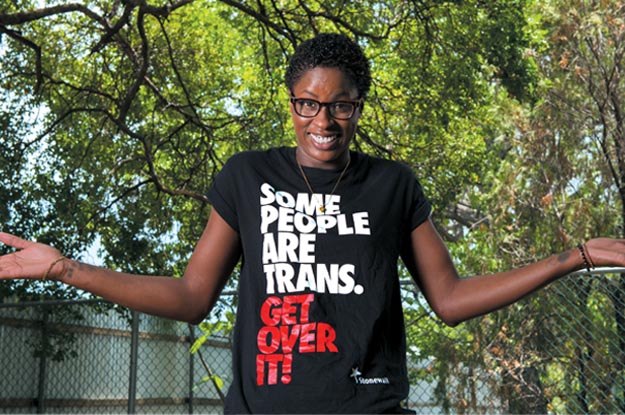Correction appended below
A few years after publicly coming out as a lesbian, Latoya Nugent, 33, was defending the rights of lesbian, gay, bisexual, and transgender (LGBT) communities in Jamaica. In July 2013, she became the education and training manager at J-FLAG—the island’s leading LGBT rights organization. Those who knew her weren’t surprised. Though her career as an LGBT advocate is just beginning, Nugent is already well-known for her dedication to promoting inclusive development and the rights of women and girls. “Latoya Nugent has transformed J-FLAG’s outreach to, and work with, LGBT people—especially lesbian and bisexual women,” Dane Lewis, executive director of J-FLAG said. “She has designed innovative initiatives such as debate competitions, social media campaigns and cultural events to raise awareness about LGBT issues in the community and general public […] and build ally support.”
Nugent has her work cut out for her. LGBT advocates in Jamaica are few and far between—even more so among women—given the culture of discrimination there and the threat of bodily harm they could face. Her mission is to build and mobilize a supportive community and increase the visibility of a vulnerable minority that faces unique struggles in navigating life in Jamaica. In a society where over 60 percent of the population opposes constitutional protections for LGBT rights—including over 60 percent of businesspersons who do not support workplace protections, and over 50 percent who would not hire someone who openly identifies as LGBT—Nugent knew that she had to become actively involved in any process that would address and reduce the incidence of discrimination.1
Nugent’s training in philosophy and comparative politics in her undergraduate and graduate studies, as well as her experience as an educator and researcher, provide her with a solid foundation for this role. The relative invisibility of issues affecting lesbian and bisexual women and transgender citizens in Jamaica have left them vulnerable to sexual harassment and assault and what some call corrective sexual violence (or rape). Many are also chronically unemployed and underemployed. On a more basic level, Jamaica has a limited cadre of qualified doctors and medical professionals who understand the health needs of non-heterosexual women. More troubling still, they are marginalized by the larger women’s movement in Jamaica, which appears to pay little attention to their needs, and they have few advocates in positions of power.
But Nugent is optimistic. She believes Jamaica is capable of transforming itself into a society that doesn’t discriminate based on gender, gender identity or sexual orientation. In November 2014, Nugent cofounded Women’s Empowerment for Change (WE-Change) with 20 other lesbian and bisexual women. All of the founders successfully completed a training program in public policy and advocacy that Nugent both designed and managed. WE-Change is dedicated to increasing the participation of lesbian, bisexual and transgender women in advocacy for their economic, social and political rights, and creating safe spaces for them to vocalize issues, socialize and support one another. WE-Change actively works toward reducing homophobia among authorities, as well as parents and guardians. Much of Nugent’s inspiration in this regard comes from her partner and cofounders.
But advocacy doesn’t always require taking yourself seriously. Nugent enjoys incorporating her message into the T-shirts she designs and gives to friends with messages like the Stonewall’s Education for All campaign popular slogan, “Some people are gay. Get over it!” and J-FLAG’s “Show Respect Like Ah Boss.” It’s no accident that her T-shirts have become a familiar sight at Jamaican soca events.
Despite the challenges, the LGBT movement in Jamaica is stronger than ever. “More and more LGBT people [are] standing for their rights, for equality before the law, for equity in social services and protection, and demanding that they be treated with the inherent dignity with which they were born. I am one of those LGBT people. And I remain committed to eliminating all forms of stigma and discrimination against my community in general and against the women in my community in particular,” she said.
Because of an editing error, a previous version of this article misspelled the name of Dane Lewis, executive director of J-FLAG.




